Looking to Find That Dream Job? Engineering Career Services and Its Upcoming Spring Engineering Career Fair Can Help
January 28, 2019
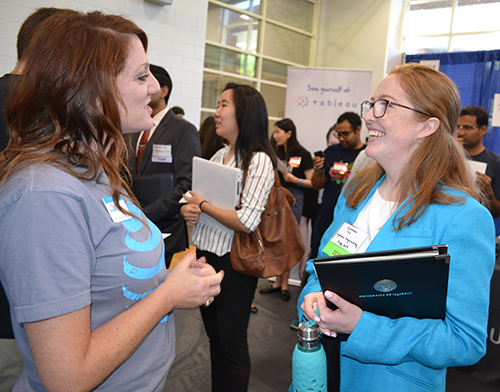
During the Fall 2018 Engineering Career Fair, Systems Engineering senior Siobhan Fox (right) chats with an AT&T recruiter.
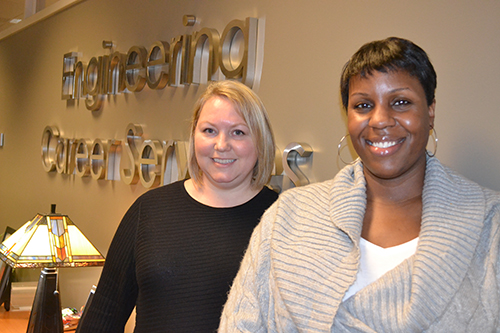
ECS Associate Director, Lauren Stites (left) and ECS Assistant Director Ulyssia Dennis
Start early! This is the pithy advice proffered by Engineering Career Services (ECS) job-hunt gurus Ulyssia Dennis and Lauren Stites. By “Start Early!” they mean that practically the second engineering students arrived back on campus after winter break, they should have roused themselves from their eggnog-and-holiday-goodie-induced fog and rushed right over to Engineering Career Services. Why? It’s time to get geared up for the spring Engineering Career Fair (ECF) on January 30–31.
When it comes to leveraging that shining new engineering degree into a much-coveted job in the not-too-distant future, Illinois engineering students should heed Dennis and Stites’ “Start early!” mantra. First, they recommend that students start focusing on finding that perfect job early in the semester by attending the spring Engineering Career Fair to be held at the ARC from 1:00 pm to 4:00 pm on Wednesday, January 30, and 1:00-6:00 pm on Thursday, January 31st. By start early, they also mean that students should take advantage of services the ECS provides in the weeks prior to the Fair (and after it!). Finally, while they acknowledge that seniors who have not yet landed that dream job yet should, of course, continue to use their services, they also recommend that freshmen—rookies who are most likely clueless when it comes to job hunting—should begin preparing as early as possible during their career at Illinois.
While the fall semester’s career fair is the “peak of the college recruiting season,” according to ECS’s Assistant Director Ulyssia Dennis, at the spring fair “there are still a lot of great opportunities for students and companies.” For instance, in the 2018 spring engineering career fair, around 5700 students participated. So if you’re a senior and still looking for work, spring is definitely a good time to come. Plus, ECS Associate Director Lauren Stites, advises that, “Even those who maybe have already secured an internship, they could still potentially go to network.”
Regarding networking, Dennis adds,“We view the career fair as a place for the companies and the students to make tangible connections. We want that to be a place where students can potentially be invited to interviews, which we ultimately hope will lead to job offers.”
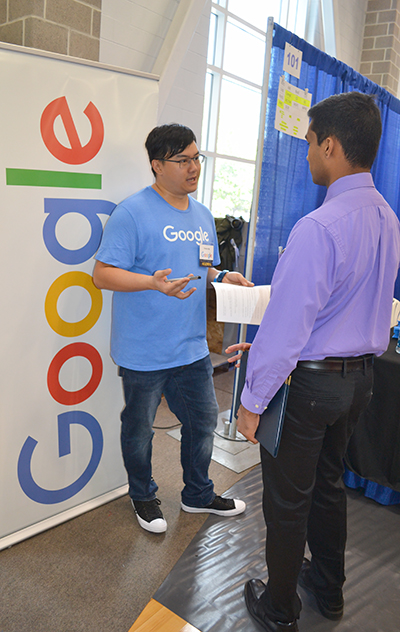
An Illinois alumnus (left) who currently works for the internet giant, Google, chats with an Illinois Engineering student at the Fall 2018 ECF.
While students often show up at the ECF more than once during the two-day fair, around 7000 different students made roughly 10,000 visits to this past fall’s ECF, while around 3000 different students visited last spring’s fair. And even though 447 recruiters showed up at last fall’s ECF, a good number (around 200 or more) are expected this spring, including such stars as Google, Amazon, and Microsoft.
Also helping out with the Fair is the Engineering Council (formerly Expo), which used to hold an entirely student-run career fair separate from ECS’s fair. However, since 2018, they’ve joined forces, and the Council is currently partnering with ECS to help run the event.
“They pretty much provide the onsite execution for the career fair,” claims Stites, “which has freed up the ECS team to be able do more of the coaching for the students, because we know the Expo committee team will make sure that the fair is running on site.”
Though it’s a pretty busy time for the Engineering Council students, extra benefits include additional leadership experience and more time networking with recruiters. According to Stites, Council students get to " interact with companies at a deep level in addition to when they're at the career fair booth, having a conversation about their resume.” Plus, she believes recruiters also hopefully recognize, “Oh, you're the student that checked me in this morning, or you're the student who answered my question about x, y, z.” So, the opportunity to “put some muscle behind the career fair and have additional exposure to companies is something we hope is meaningful to them,” she adds.
While the two Career Fairs are ECS’s biggest, most well-known events, Stites says that its various activities that take place day-in, day-out throughout the year are just as important. And quite a number of these services are crammed into the beginning of the semester, including in the evenings, because ECS’s crack advising team has only about two weeks to get students ready between when the semester starts and the career fair itself.(Click here for a brochure listing ECS's spring 2019 workshops and events.
"We have an amazing advising team,” Stites acknowledges. “Even in the fall where it's boom—right into the semester—the number of workshops, drop-in appointments that our advising team deliver to students to give them as many opportunities to get that resume polished or practicing interviewing is quite impressive."
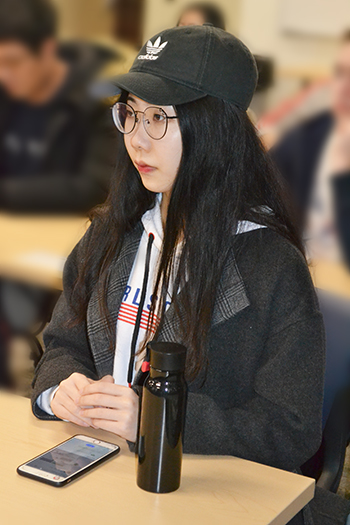
An engineering student at a recent Lunch and Learn learns about interview techniques.
Some of these services include:
- Career Resource Guide, 2018-2019: Publication provides numerous career resources such as: campus career fairs, how to access Handshake, ROAR Resume Technique (Results Oriented and Relevant Resumes), a comprehensive list of action verbs to use on résumés, sample résumés, cover letter guidelines, elevator pitch essentials, career fair success strategies, how to prepare for an interview, mastering the hidden job market through networking.
- Lunch and Learn: Over lunch (pizza), mini workshops cover topics such as how to have a successful Career Fair experience, interview, do independent job searches, network, and how to apply to graduate school and/or to medical school, etc.
- Drop-In Appointments: Quick, 15-minute advising appointments
- Resume Career Studio: A dynamic space where students can work on their careers by speaking with an ECS career advisor, have their resume reviewed, or bring their laptop to work on career-related projects. When: 1/18 4:00-6:00 pm and 1/29, 4:00-6:00 pm. Where: 2240 DCL.
- Resume Reviews: Trained student associates review students’ resumes prior to career fair and during Review Me sessions, where trained peer reviewers review résumés for members of student groups/organizations.
- Recruiters Panel: Students value hearing from employers talk to them about career fair success.
- Panel Series: Students can hear from working professionals about non-traditional career paths, interning, consulting, etc.
- Newsletter: Sign up for ECS’ newsletter which gives students tips and tricks related to job hunting.
- Career Fair Plus: This app includes an interactive map of all of the different companies participating in the fair; plus, students can do searches of different companies they might want to visit based on their career interests.
- Resumania: This event is held the day before the fair; students can bring their resume and get feedback from participating employers. When: 1/29/19, 10:00 am-4:00 pm. Where: 3300 DCL.
- Hand Shake software: For the entire campus, this software fosters networking and connecting, allowing students to search for jobs, attend career events, learn about employer events, and schedule career advising appointments. Click here to sign up for a Handshake@Illinois account.

Regarding career fair success, despite the large number of students who participate vs. the much smaller number of recruiters present, can students still benefit during the short amount of time they might have with a recruiter? "The answer is yes,” Stites asserts. “They can have quality interactions with employers there." Even though they might only chat for 3–5 minutes, she claims that can still be a good interaction.
However, in light of the short amount of time a student might have with a company’s representative, she recommends that students prepare an Elevator Pitch—a 60-second summary of their skill set.
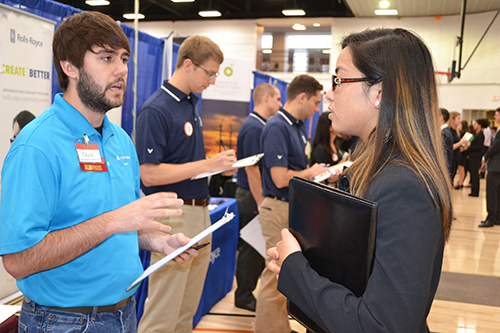
A recruiter who is an Illinois Alumnus (left), chats with a student during the fall 2018 ECF.
Regarding the benefit of chatting with a recruiter, no matter how briefly, Dennis would know from personal experience. She once was one. Before taking the job at Illinois, she used to recruit for Texas Instruments. She reports that recruiters know they have to fill their job openings, but they also “genuinely want to see students be successful and will give just a quick nugget to encourage, enlighten, and inspire a student.”
Do the two have any wisdom they’d like to share with students about how to land that dream job? Both exhort: “Start early!” Regarding encouraging freshmen to do so, Stites indicates that she and her colleagues are “intentionally with trying to create…a freshman friendly event.” They say freshmen should start attending the fair early so they can see what it’s like, “so that it's not their senior year and they're walking in for the first time.”
Another piece of advice? Be persistent: “A ‘no’ once doesn’t always mean a ‘no,’” Stites claims. She indicates that she often tells students she works with: “Because maybe you did go in the fall and talk to a company and they said, ‘No,’ or you didn't get an interview.
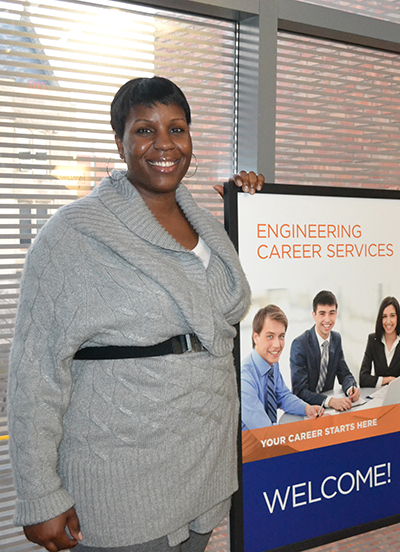
Ulyssia Dennis, ECS Assistant Director whose main duty is interacting with companies.
But if they're there in the spring, that doesn't mean you shouldn't go talk to them again. If you're still interested in what they do and you feel like you—especially as a freshman—now you have a semester under your belt and you can talk about the classes you took last fall, as before, you were just getting your feet wet; it was week three!” So she encourages students to go back and talk to the company’s recruiters again.
“We've had recruiters come and share stories before, saying, ‘I went my freshman and sophomore year; finally it was junior year, and I had an opportunity for an interview.’ Or they went their junior year, and it was a ‘No,’ but finally, their senior year it happened. It goes back again full circle to that building the relationships and recruiters can start to recognize you,” Stites explains.
Dennis’s “Just start early!” advice echoes that of Stites, as well as that of I-STEM, which fosters early engagement to introduce youngsters to what STEM is and to expose them to education opportunities.
She shares an anecdote that exemplifies the benefits of starting early. “One of our rock star recruiters, who is one of those individuals who is an outstanding technical professional but also just genuinely wants to see students be successful, has a daughter who is a senior in high school. She actually came on the visit with him while he was recruiting at the fall career fair. He was like, ‘'Hey, can she just get 10 minutes to walk around the fair?’ We were like, 'Heck yeah!' For one, we were hoping she would be a future Illinois student—but in that quest to expose students to possibilities in STEM—encouraged her to swing by the career fair.
Another nugget of wisdom from Dennis: “Have an open mind!” She indicates that “There are amazing opportunities in what they might think are unlikely places. So just be open to exploring and having a conversation. Even if it's not one of your top five companies, go ask questions and listen as a part of that exploration journey.”
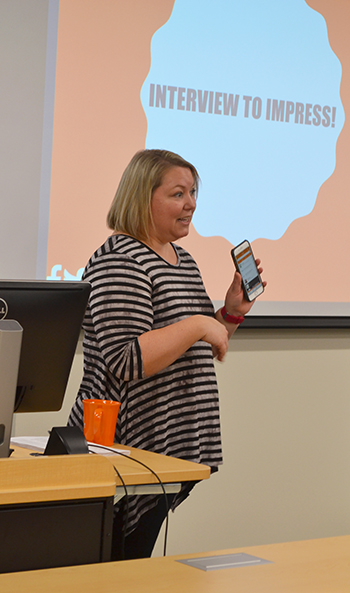
During a recent Lunch and Learn, Lauren Stites shares interview tips.
Both ladies are quite passionate about helping Illinois Engineering students succeed. “I think the most rewarding thing about my job is the student success,” says Dennis. “Watching the students through their journey, whether it's building their confidence, just building on what happens in version one,” she explains, referring to their initial stab at creating a resume, “to their final edits, and how that changes and how they grow.”
She also finds getting to know students to be rewarding. “For some students, it’s the relationship building piece that I get to be part of, depending on how quickly or how often they come in…Or the student who really struggles with their confidence level and you're able to kind of remind them, 'You're at the University of Illinois. This is not something everyone gets to do!' and reminding them of just how brilliant they are."
Stites shares what she finds to be most rewarding about her job: the long-term impact she and her colleagues can have on students’ careers.
"Even beyond the time they have with us at Illinois…” she explains, regarding their life-long investment in the students.“When students work with an adviser on their resume, they now have a tool that they can use and refine and adapt for their career. When they have a mock interview with an adviser, they are building confidence that will remain with them throughout their career.”
She claims that they’re not only impacting the students themselves long term, but also all the people the students might impact over the course of their career.
“Especially when we think about STEM,” she explains. “We have students who are right now and in the future, creating innovation that will change the world, and we got to have a little contribution in that. That is for me the most rewarding piece.”
Story and photographs:Betsy Innes, Communications Specialist, I-STEM Education Initiative
For more related stories, see: Career Resources, Engineering, 2019
- Engineering Career Fair Fosters Networking, Helps Students Land Internships and Jobs
- Engineering Career Services Helps Students Prepare for Careers, Upcoming Career Fair
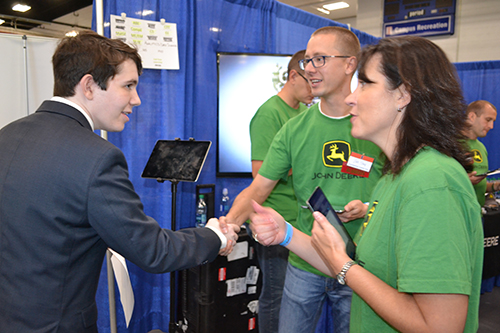
An Illinois Engineering student (left) interacts with recruiters from John Deere during the fall 2018 ECF.
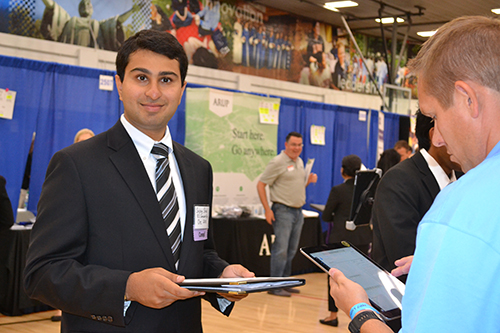
A Computer Science senior waits to chat with a recruiter during the fall 2018 ECF.
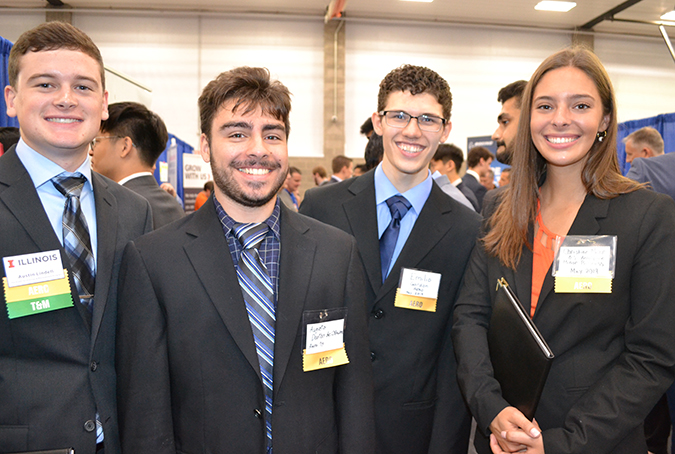
Aerospace students dressed to the nines prepare to visit Boeing, an aerospace company recruiting at the fall 2018 fair.













.jpg)
















